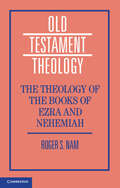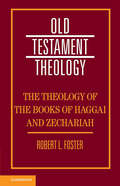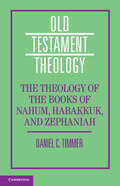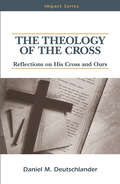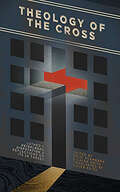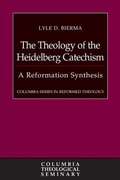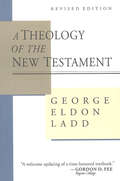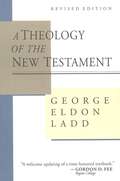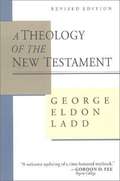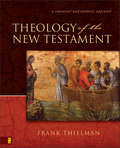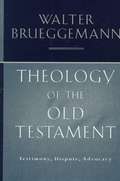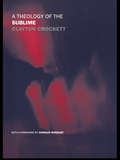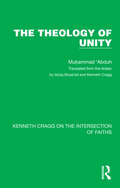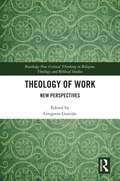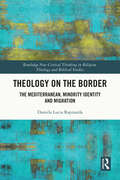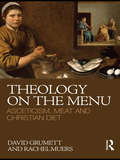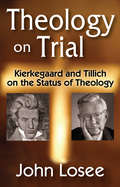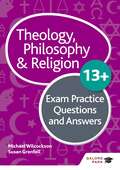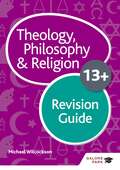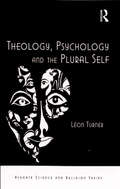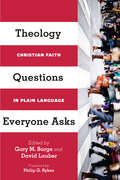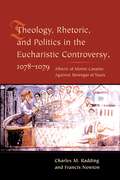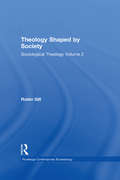- Table View
- List View
The Theology of the Books of Ezra and Nehemiah (Old Testament Theology)
by Roger S. NamIn the opening verses of the Book of Ezra-Nehemiah, King Cyrus exhorts the exiled Judeans to return to Jerusalem to restore worship in Jerusalem. It then narrates this restoration through the construction of the temple, the repair of the city walls, and the commitment to the written Torah. In this volume, Roger Nam offers a new and compelling argument regarding the theology of Ezra-Nehemiah: that the Judeans' return migration, which extended over several generations, had a totalizing effect on the people. Repatriation was not a single event, but rather a multi-generational process that oscillated between assimilation and preservation of culture. Consequently, Ezra-Nehemiah presents a unique theological perspective. Nam explores the book's prominent theological themes, including trauma, power, identity, community, worship, divine presence, justice, hope, and others – all of which take on a nuanced expression in diaspora. He also shows how and why Ezra-Nehemiah naturally found a rich reception among emerging early Christian and Jewish interpretive communities.
The Theology of the Books of Haggai and Zechariah (Old Testament Theology)
by Robert FosterTucked away at the end of the Minor Prophets, the Books of Haggai and Zechariah offer messages of challenge and hope to residents of the small district of Yehud in the Persian Empire in the generations after the return from Babylonian exile. In this volume, Robert Foster focuses on the distinct theological message of each book. The Book of Haggai uses Israel's foundational event - God's salvation of Israel from Egypt - to exhort the people to finish building the Second Temple. The Book of Zechariah argues that the hopes the people had in the prophet Zechariah's days did not come true because the people failed to keep God's long-standing demand for justice, though hope still lies in the future because of God's character. Each chapter in this book closes with a substantive reflection of the ethics of the major sections of the Books of Haggai and Zechariah and their implications for contemporary readers.
The Theology of the Books of Nahum, Habakkuk, and Zephaniah (Old Testament Theology)
by Daniel C. TimmerThe books of Nahum, Habakkuk, and Zephaniah address problems in and around ancient Judah in ways that are as incisive and critical as they are optimistic and constructive. Daniel C. Timmer's The Theology of the Books of Nahum, Habakkuk, and Zephaniah situates these books in their social and political contexts, examining the unique theology of each as it engages thorny problems in Judah and beyond. In dialogue with recent scholarship, this study focuses on these books' analysis and evaluation of the world as it is, focusing on both human beings and their actions, and God's commitment to purify, restore, and perfect the world. Timmer also surveys these books' later theological use and cultural reception. His study brings their theology into dialogue with concerns as varied as ecology, nationalism, and widespread injustice. It highlights the enduring significance of divine justice and grace for solid hope and effective service in our world.
The Theology of The Cross: Reflections on His Cross and Ours (Impact Series)
by Daniel M DeutschlanderWhat did Jesus mean when he said, "Take up your cross and follow me?"The Bible teaches that Jesus Christ is the true center of our salvation.Through a deep and powerfully written examination of Scripture, author Daniel Deutschlander demonstrates that without Jesus' sacrifice on the cross, we would be lost. However, because of Jesus' death and resurrection, we now have the promise of eternal life in heaven with him.That changes everything for us!The Theology of the Cross will also remind you that since Jesus first loved you, it is now your joy to take up your own cross daily and follow him. What does that look like for you? This book answers that questions and points you to our Savior's cross, which empowers you to live each day for him.Here's what people are saying about this book:"The theology of the cross is a matter of urgent, practical concern for every Christian. Beginning with the words of Jesus commanding... us to deny ourselves and take up our cross and follow him, Professor Deutschlander shows how the path of self-denial, repentance, difficulty, and struggle is the only place where the gospel reveals its true glory and bears its fruit in our lives." –Professor Joel D. Fredrich, Martin Luther College, New Ulm, Minnesota"This book warns us of Satan's efforts to turn us from Christ to ourselves. It comforts us with the assurance that the cross of Christ leads to heavenly glory." –Professor James F. Korthals, Wisconsin Lutheran Seminary, Mequon, Wisconsin
Theology of the Cross: Luther's Heidelberg Disputation & Reflections on Its 28 Theses
by Caleb Keith Kelsi Klembara Cindy Koch Steven D Paulson Chad Bird Daniel Van VoorhisThe Theology of the Cross is one of the core elements of Martin Luther's theology. The development of this doctrine through the Heidelberg Disputation has been considered an essential element of Luther's breakthrough on justification, and crucial to his theological reforms and future split with the Roman Catholic Church. These statements by Luther, originally penned to be defended in debate, are counter-intuitive, contrary, offensive, and thrilling paradoxes, starting with the first and most astounding of them all: "The Law of God, the most salutary doctrine of life cannot advance humans on their way to righteousness, but rather hinders them." We hope the collection of interpretations that follow the theses in this book will help you to understand their impact.
The Theology of the Heidelberg Catechism
by Lyle D. BiermaThe Heidelberg Catechism, first approved in 1563, is a confessional document of the Protestant movement considered one of the most ecumenical of the confessions. Published to coincide with the catechism's 450th anniversary, this book explores the Heidelberg Catechism in its historical setting and emphasizes the catechism's integration of Lutheran and Reformed traditions in all of its major doctrines. An appendix contains a translation of the Heidelberg Catechism recently prepared and adopted by three of the Reformed denominations that recognize the catechism as one of their confessions: the Presbyterian Church (U. S. A. ), the Reformed Church in America, and the Christian Reformed Church in North America.
A Theology of the New Testament
by George Eldon LaddLadd's magisterial work on New Testament theology has well served thousands of seminary students since its publication in 1974. Enhanced and updated here by Donald A Hagner, this comprehensive, standard evangelical text now features augmented bibliographies and two completely new chapters on subjects that Ladd himself wanted to treat in a revised edition—the theology of each of the Synoptic Evangelists and the issue of unity and diversity in the New Testament—written, respectively, by R. T. France and David Wenham.
A Theology of the New Testament
by George Eldon LaddLadd's magisterial work on New Testament theology has well served thousands of seminary students since its publication in 1974. Enhanced and updated here by Donald A Hagner, this comprehensive, standard evangelical text now features augmented bibliographies and two completely new chapters on subjects that Ladd himself wanted to treat in a revised edition—the theology of each of the Synoptic Evangelists and the issue of unity and diversity in the New Testament—written, respectively, by R. T. France and David Wenham.
A Theology of the New Testament
by George Eldon Ladd Donald A. HagnerLadd's magisterial work on New Testament theology has well served thousands of seminary students since its publication in 1974. Enhanced and updated here by Donald A Hagner, this comprehensive, standard evangelical text now features augmented bibliographies and two completely new chapters on subjects that Ladd himself wanted to treat in a revised edition--the theology of each of the Synoptic Evangelists and the issue of unity and diversity in the New Testament.
Theology of the New Testament
by Frank S. ThielmanStudying the theology of the New Testament can be a daunting task, even to the knowledgeable Bible student or pastor. Each of the twenty-seven books, written by various authors, has its own theological emphasis and nuances. How do we elicit a coherent message from such theological diversity, especially given that some of the theological statements in the New Testament seem to be at odds with one another? Is such an endeavor achievable or even valid? Theology of the New Testament takes a balanced approach in response to these challenges. Frank Thielman presents a theology of the New Testament that is careful to take into account the cultural and historical circumstances surrounding each book and the New Testament as a whole. He not only examines each book’s theological content individually, but also in relation to the rest of the New Testament, particularly within each of the three theological units that comprise the New Testament: the gospels and Acts, the Pauline epistles, and the general epistles and Revelation. This canonical and synthetic approach honors both the theological diversity of the various books and the theological connections between the books. In the end, Thielman finds a unified theological vision of the New Testament, anchored in the centrality of Jesus Christ. Frank Thielman’s Theology of the New Testament is an outstanding achievement. The book is marked by scholarly depth, exegetical rigor, and theological profundity. Both students and professors will profit immensely from this lucid treatment of the theology contained in the New Testament documents. Thomas R. Schreiner Professor of New Testament, The Southern Baptist Theological Seminary An accessible presentation of the key theological points of the New Testament books by an accomplished New Testament scholar and teacher. Its clear style, lucid organization, and sound theological insight make it a prime resource for serious students in both the academy and the church. Karen H. Jobes, PhD Associate Professor of New Testament, Westmont College
Theology of the Old Testament: Testimony, Dispute, Advocacy
by Walter BrueggemannBrueggemann focuses on the metaphor and imagery of the courtroom trial in order to regard the theological substance of the Old Testament as a series of claims asserted for Yahweh, the God of Israel. This provides a context that attends to pluralism in every dimension of the interpretive process and suggests links to the plurality of voices of our time.
A Theology of the Sublime
by Clayton CrockettA Theology of the Sublime is the first major response to the influential and controversial Radical Orthodoxy movement.Clayton Crockett develops a constructive radical theology from the philosophy of Immanuel Kant - a philosophy attacked by Radical Orthodoxy - to show Kant's relevance to postmodern philosophy and contemporary theology.
The Theology of Unity (Kenneth Cragg on the Intersection of Faiths #2)
by Muhammad 'AbduhOriginally published in 1966, this was the first of Muhammad ‘Abduh’s works to be translated into English. Risālat al Tauhid represents the most popular of his discussion of Islamic thought and belief. ‘Abduh is still quoted and revered as the father of 20th Century Muslim thinking in the Arab world and his mind, here accessible, constituted both courageous and strenuous leadership in his day. All the concerns and claims of successive exponents of duty and meaning of the mosque in the modern world may be sensed in these pages. The world and Islam have moved on since ‘Abduh’s lifetime, but he remains a source for the historian of contemporary movements and a valuable index to the self-awareness of Arab Islam.
Theology of Work: New Perspectives (Routledge New Critical Thinking in Religion, Theology and Biblical Studies)
by Gregorio GuitiánTheology of Work: New Perspectives emerges from the necessity to continue theological reflection on work in light of the challenges posed by our contemporary world. The contributions offer a global perspective of the meaning of work, drawing from Trinitarian theology, theology of creation, eschatology, theological anthropology, and Christology. They shed light from the perspective of faith on the integration of different work dimensions, and consider how the theology of work is called to challenge social structures in light of revelation. The volume mostly develops the theology of work from a Catholic perspective, but Protestant and Orthodox approaches are also explicitly explored. The chapters cover different theological areas, such as biblical, dogmatic, patristic, and moral theology, to provide enriching and complementary perspectives. Offering fresh and valuable theological insights on work, this book will be of particular interest to scholars of theology and religious studies.
Theology on the Border: The Mediterranean, Minority Identity, and Migration (Routledge New Critical Thinking in Religion, Theology and Biblical Studies)
by Daniela Lucia RapisardaFocusing on the Mediterranean, this book offers a theological hermeneutics from the perspective of the margin/border and a theological hermeneutics of the border. At the core is a case study of the Italian Protestant minority and its engagement with issues of migration. While much of current migration theology is built around the principle of sacralization of the migrant person or 'vertical' association between divinity (God or Jesus) and people on the move, this work offers a 'horizontal' perspective on humanization or recognition of the value of every human being, based on the principle of a shared humanity created in God’s image, and a sense of identification, first by people at the margins. This approach seeks to avoid essentializing migrantness and victimhood. Elaborations on the relation between identity and migration are often sustained by exclusionary logics that lead to repressive policies. The book proposes a contextual theological reflection on minority identity that is at its core inclusive. It offers a contribution to theology beyond confessional borders and is open to dialogue with other disciplines, particularly critical border studies.
Theology on the Menu: Asceticism, Meat and Christian Diet
by David Grumett Rachel MuersFood - what we eat, how much we eat, how it is produced and prepared, and its cultural and ecological significance- is an increasingly significant topic not only for scholars but for all of us. Theology on the Menu is the first systematic and historical assessment of Christian attitudes to food and its role in shaping Christian identity. David Grumett and Rachel Muers unfold a fascinating history of feasting and fasting, food regulations and resistance to regulation, the symbolism attached to particular foods, the relationship between diet and doctrine, and how food has shaped inter-religious encounters. Everyone interested in Christian approaches to food and diet or seeking to understand how theology can engage fruitfully with everyday life will find this book a stimulus and an inspiration.
Theology on Trial: Kierkegaard and Tillich on the Status of Theology
by John LoseeSoren Kierkegaard sought to clarify what it means to be a Christian. He concluded that a one-on-one relationship with God is required, to encounter the "Absolute Paradox," defined as an immutable being entering into and transforming human history. Kierkegaard's dim view of a systematic Christian theology includes a preoccupation with theological exposition that distracts from the essential task of achieving a personal relationship with Jesus Christ. Alternatively, Paul Tillich's theology is based on a triadic relationship of being, nonbeing and Being-Itself (God), a doctrine of symbols, and a reinterpretation of the Incarnation. It correlates a culture's questions and concerns with the Christian message to certain criteria of acceptability that, to Tillich, must satisfy the "Protestant Principle," stipulating that a theological system both restates the present-time Christian message and acknowledges that this restatement cannot be the definitive, ultimate expression of that message. Theology on Trial presents and assesses whether, and to what degree, Tillich's theology satisfies his own criteria of acceptability. An acceptable theology must be logically consistent and free of equivocation. The concluding section of the book examines the views of each author from the standpoint of the other.
Theology Philosophy and Religion 13+ Exam Practice Questions and Answers
by Michael Wilcockson Susan GrenfellThis book contains a wealth of exam-style questions to help students prepare for the 13+ Common Entrance exam in Theology, Philosophy and Religion. Tailored specifically to the latest syllabus, all question come with detailed advice and model answers that enable pupils to grow in confidence and achieve top marks.- Endorsed by ISEB- Covers all three question types that could appear in the exam- Contains model answers to all questions, saving time and helping to identify areas requiring further study- Includes the ISEB Common Entrance mark scheme
Theology Philosophy and Religion 13+ Exam Practice Questions and Answers
by Michael Wilcockson Susan GrenfellThis book contains a wealth of exam-style questions to help students prepare for the 13+ Common Entrance exam in Theology, Philosophy and Religion. Tailored specifically to the latest syllabus, all question come with detailed advice and model answers that enable pupils to grow in confidence and achieve top marks.- Endorsed by ISEB- Covers all three question types that could appear in the exam- Contains model answers to all questions, saving time and helping to identify areas requiring further study- Includes the ISEB Common Entrance mark scheme
Theology Philosophy and Religion for 13+ Revision Guide
by Michael WilcocksonThis indispensable revision guide is mapped precisely to the new Theology, Philosophy and Religion syllabus for 13+ Common Entrance, and provides students with a concise summary of everything they need to know for the latest exam beginning autumn 2019. Endorsed by ISEB, it covers all key content in an accessible format and includes test-yourself questions that embed knowledge as students work through the book.- Endorsed by ISEB- Summarises the key content for the new Theology, Philosophy and Religion syllabus replacing Religious Studies A- Guided activities and test-yourself questions enable pupils to recall knowledge and build exam-room confidence- Includes a handy glossary for easy reference throughout the book
Theology Philosophy and Religion for 13+ Revision Guide
by Michael WilcocksonThis indispensable revision guide is mapped precisely to the new Theology, Philosophy and Religion syllabus for 13+ Common Entrance, and provides students with a concise summary of everything they need to know for the latest exam beginning autumn 2019. Endorsed by ISEB, it covers all key content in an accessible format and includes test-yourself questions that embed knowledge as students work through the book.- Endorsed by ISEB- Summarises the key content for the new Theology, Philosophy and Religion syllabus replacing Religious Studies A- Guided activities and test-yourself questions enable pupils to recall knowledge and build exam-room confidence- Includes a handy glossary for easy reference throughout the book
Theology, Psychology and the Plural Self (Routledge Science and Religion Series)
by Léon TurnerIs the human self singular and unified or essentially plural? This book explores the seemingly disparate ways that Christian theology and the secular human sciences have approached this complex question. The latter have largely embraced the idea of the plural self as an inescapable, even adaptive feature of psychological life. Contemporary Christian theology, by contrast, has largely neglected recent psychological accounts of the naturalness of self-plurality, and has sought to reaffirm the self's unity in opposition to those postmodern theorists who would dismantle it. Through an original analysis of recent theological and secular accounts of self and personhood, this book examines the extent of the intertheoretical disparity and its broader implications for theology's dialogue with the human sciences in general, and psychology in particular. It explains why theologians ought to take questions about the plurality of self very seriously, and how they overlap with many of the central concerns of contemporary theological anthropology, including the notions of relationality, particularity and human sinfulness. Introducing a novel psychological framework to distinguish various understandings of self-disunity, the author argues that contemporary theology's blanket condemnation of self-multiplicity is misconceived, and identifies a possible means of reconciling theological and human scientific accounts.
Theology Questions Everyone Asks: Christian Faith in Plain Language
by Gary M. Burge Philip Graham Ryken David LauberIsn't talk about God really a guessing game?What good is the Old Testament?How can we have free will if God controls everything?The virgin birth. Really?What does an earthquake say about God?Is the Holy Spirit still at work in churches today?What did Jesus think about getting married?Does being a Christian mean having particular political views?
Theology, Rhetoric, and Politics in the Eucharistic Controversy, 1078-1079: Alberic of Monte Cassino Against Berengar of Tours
by Charles Radding Francis NewtonIn the concluding stages of the eleventh-century Eucharistic Controversy, which turned on whether, and how, sacramental consecration changed the nature of bread and wine at the altar, Alberic of Monte Cassino composed a small but important treatise. Alberic was the most renowned teacher of rhetoric in his time, and his treatise, buttressed by appeal to the authority of the Church Fathers, was said by contemporaries to have "utterly destroyed" the argument of his opponent, Berengar of Tours, that the bread and wine survived its consecration. Modern scholars had long believed Alberic's treatise to be lost. This book demonstrates that this crucial document, far from being lost, is an existing identifiable text. By showing conclusively that this work was written by Alberic, Radding and Newton transform our understanding not only of the particulars of the controversy and papal politics but also of the intellectual process by which theological doctrines took shape in mediaeval Church councils. The book includes the full Latin text and the first translation of Alberic's treatise.
Theology Shaped by Society: Sociological Theology Volume 2 (Routledge Contemporary Ecclesiology)
by Robin GillTheology Shaped by Society argues that the sociology of knowledge can make an important contribution to theology. Part I argues that theology can be seen as a 'socially constructed reality' that is sometimes dangerously related to power but, at other times, that is a positively engaged discipline taking the risk of being shaped by particular societies and cultures. From this second perspective theology is seen properly as a thoroughly relational discipline, as itself a social system. Part II examines mission shaped by society and maps this in practical terms by examining recent, and surprising, religious trends in York. Part III shows how music can imaginatively shape theology and reveal unexpected resonances. Over the last 30 years a number of theologians have been using aspects of sociology alongside the more traditional resources of philosophy. In turn, sociologists with an interest in theology have also contributed to an interaction between theology and sociology. The time is right to revisit the dialogue between theologians and sociologists. In his new trilogy on Sociological Theology, Robin Gill makes a renewed contribution to the mapping of three abiding ways of relating theology and sociology, with the three volumes covering: Theology in a Social Context; Theology Shaped by Society; and Society Shaped by Theology.
